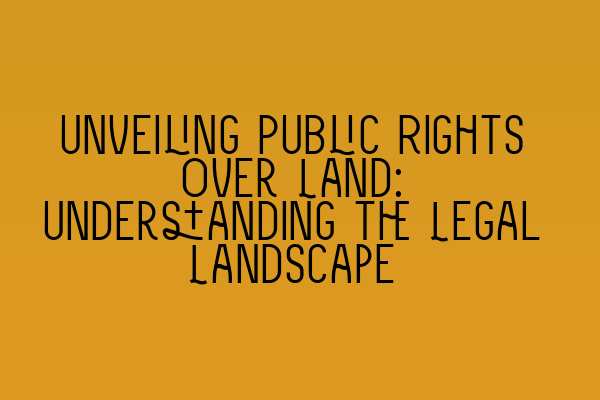Unveiling Public Rights Over Land: Understanding the Legal Landscape
Welcome to SQE Property Law & Land Law, where we strive to unravel the complex legalities surrounding property rights and land ownership. In this blog post, we will delve into the intricate world of public rights over land. Knowing and understanding these rights is essential, as they can have a significant impact on property transactions, development projects, and disputes.
What are Public Rights Over Land?
Public rights over land refer to the legal entitlements that members of the public have over certain areas of land. These rights are typically established through historical and traditional use, and they can include rights such as access, passage, and recreation.
It is important to note that public rights over land can vary depending on the jurisdiction and the specific laws in place. Therefore, it is crucial to consult with a qualified property law solicitor to ensure a comprehensive understanding of the legal landscape.
The Different Types of Public Rights Over Land
Understanding the different types of public rights over land is key to navigating the legal complexities that arise in property transactions and disputes. Let’s explore some of the most common types:
Right of Way
A right of way grants a person or group the legal right to pass through a specific area of land owned by another party. This right is often essential for accessing properties that are otherwise landlocked or located in a remote area. Disputes over rights of way can be complex, requiring a thorough examination of historical usage and legal documentation.
Public Access
Public access rights allow members of the public to enter and use certain areas of land for recreational purposes, such as walking, hiking, or fishing. These rights are particularly prevalent in rural and natural areas, where public access is essential for preserving and enjoying the environment.
Commons
Commons are areas of land that are jointly owned or used by the local community. These areas can include public parks, village greens, and other spaces designated for communal use. The laws governing commons can vary, and it is essential to consult with a property law expert to navigate any issues that may arise.
Foreshore Rights
Foreshore rights pertain to land located between the high and low watermarks on coastal areas. These rights can include access for fishing, gathering shellfish, or recreational activities. However, it is crucial to consider any restrictions or regulations that may apply to protect the environment and ensure public safety.
Unraveling the Legalities: Challenging Public Rights Over Land
While public rights over land are established through historical usage and legal precedent, there may be instances where these rights are challenged. Disputes can arise when there is ambiguity surrounding the existence, scope, or proper exercise of public rights over land. In such cases, seeking legal advice from a property law solicitor is vital to navigate the complexities of the legal landscape.
Proving or defending public rights over land often requires meticulous examination of historical documents, witness testimony, and expert analysis. With the assistance of a property law expert, individuals can ensure that their rights are protected or contested appropriately.
Conclusion
Understanding public rights over land is crucial for property owners, developers, and anyone involved in the legal landscape of property transactions and disputes. Navigating the complexities of public rights requires expert knowledge and experience.
At SQE Property Law & Land Law, we pride ourselves on our expertise in helping our clients unravel the intricate legalities surrounding public rights over land. If you require guidance or assistance in this area, do not hesitate to reach out to our team of dedicated property law solicitors.
For more informative and helpful articles related to property law and land law, feel free to explore the following:
